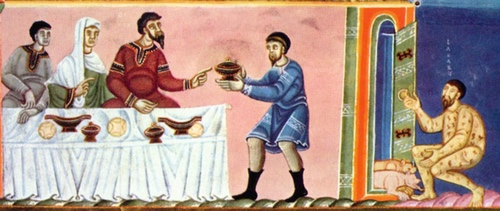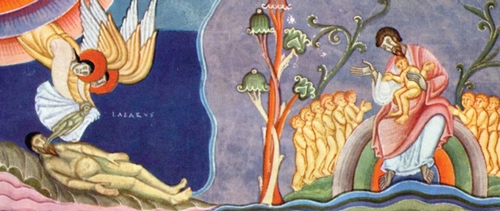I’ve written about the parable of the rich man and Lazarus (Lk. 16:19-31) a couple of times (see below), mainly for the purpose of dismissing the popular doctrine of hell. I missed an intriguing intertextual detail, however, that is attributed to Simon Perry in a Wikipedia article, though Nolland makes passing reference to it.1 The fact that Lazarus is named is sometimes taken as evidence that this is not a parable, that Jesus is thinking rather of two real historical people, one of whom has gone to suffer eternal conscious torment in hell. But there appears to be a much more compelling and meaningful explanation.
According to BDAG Lazarus is a rabbinic abbreviation of ʾElʿāzār. In Genesis 15:1-6 Abraham (Abram here) expresses his concern that if he remains childless, his heir will be Eliezer (ʾEliʿezer) of Damascus, perhaps a servant in Abraham’s household, though the translation is problematic. God’s response is “This man shall not be your heir; your very own son shall be your heir”. His offspring shall be as numerous as the stars of heaven. Abraham believes this, and it is counted to him as righteousness.

In this story Eliezer is excluded from any inheritance in Abraham. In Jesus’ story the tables are turned. The rich man who appeals to “Father Abraham”, who should have read Moses and the prophets, is disinherited, separated from Abraham by a great chasm.

The wretched Lazarus, on the other hand, who lived out on the street with the dogs, finds himself—no doubt much to his surprise—carried by angels to Abraham’s bosom.

Perhaps underlining the allusion to the Genesis text, the slow-witted rich man assumes that Lazarus is Abraham’s servant, who might be sent to relieve his suffering. In effect, Jesus has rewritten the covenant narrative: the natural heirs of Abraham have forfeited their inheritance and will suffer the consequences; the inheritance will be given instead to the adopted outsider.
This warning about the eschatological reversal of covenant membership appears at a number of points in the Gospels. John the Baptist tells the Pharisees and Sadducees who came to him, fleeing from the wrath to come, not to take it for granted that they have Abraham as their father—that they have an inalienable right to be God’s people—for “God is able from these stones to raise up children for Abraham” (Matt. 3:9; cf. Lk. 3:8).
Impressed by the faith of the centurion, Jesus says that “many will come from east and west and recline at table with Abraham, Isaac, and Jacob in the kingdom of heaven, while the sons of the kingdom will be thrown into the outer darkness” (Matt. 8:11–12).
When asked how many Jews will be saved from the coming catastrophe, Jesus warns that many will fail to enter by the narrow door and will be shut out by the Lord when he comes in judgment:
In that place there will be weeping and gnashing of teeth, when you see Abraham and Isaac and Jacob and all the prophets in the kingdom of God but you yourselves cast out. And people will come from east and west, and from north and south, and recline at table in the kingdom of God. And behold, some are last who will be first, and some are first who will be last.” (Lk. 13:28–30)
The tax-collector Zacchaeus gives away half of his wealth and makes four-fold restitution; salvation has come to his house, and he is affirmed by Jesus as a “son of Abraham” (Lk. 19:9).
Finally, I lean towards the view that the “prodigal son” is likewise restored to his “father” Abraham rather than to God. See “Who is the father in the parable of the prodigal son?”
- 1J. Nolland, Luke 9:21–18:34 (WBC 35B, 1993), 828.
I see a faint connection to the real Lazarus whom Jesus raised from the dead. “But he said to him, ‘If they do not listen to Moses and the Prophets, they will not be persuaded even if someone rises from the dead.’” Luke 16:31
@Dave Lindsay:
Here’s what Nolland has to say on the matter, for what it’s worth:
A quite different tradition-history question is posed by the link with John 11 created by the shared name and the motif of resurrection. The second of these links is made yet more precise by the considerations adduced at the discussion of v 31 below, where a Johannine note is identified. Since, apart from the shared name, the links belong to what we have seen to be a secondary development of the parable, and since, further, the name can hardly be a later insertion into the narrative (the name is needed at least in v 24), it seems best to conclude that the shared name is quite fortuitous. But if Luke, or this element of his tradition, already knew something of the John 11 tradition, then we can add an extra note to the description above of the development of vv 30–31, namely the awareness that another Lazarus had come back from the dead, and that the kind of people the editor of this parable had in mind had not been brought to repentance.
It’s certainly an odd coincidence.



Recent comments